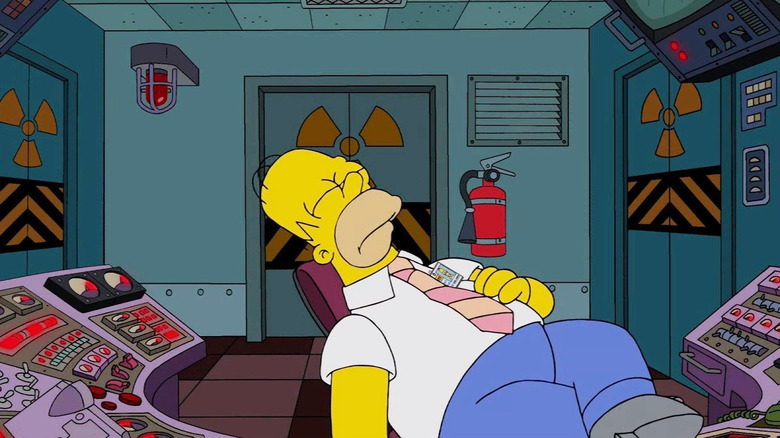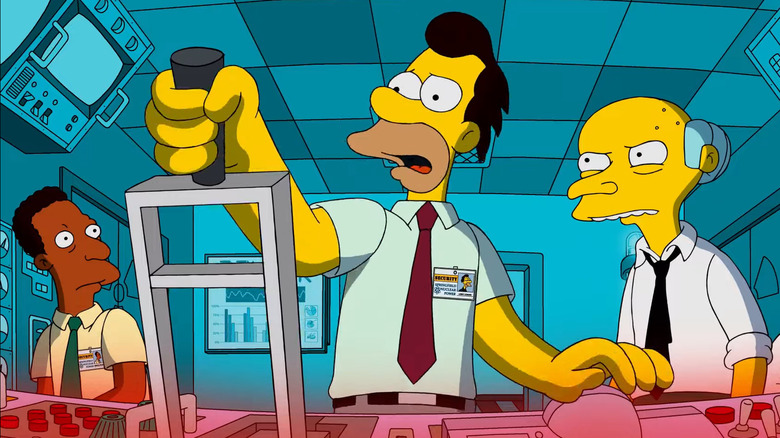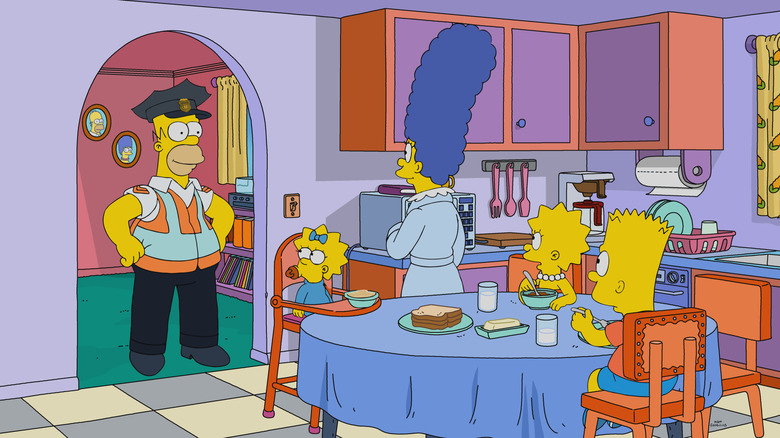The Simpsons Season 35 Premiere Addresses A Long-Running Fan Question
It's been a long remarked-upon fact, both in the show and out of it, that most of Homer Simpson's life doesn't make any sense on "The Simpsons." He has a job as a nuclear safety inspector despite his lack of a college degree and is able to afford a fairly impressive house, two cars, and at least one major vacation a year. The story of how this all came to be has changed a lot over the decades, made even more complicated by the show's floating timeline. "Homer's Odyssey" in season 1 tells us Homer was promoted to the position after leading a protest against the power plant, whereas season 3's "I Married Marge" tells us he got the safety inspector job straight away, no promotion needed. Most of the show has told us Homer got the job with just a high school education, but season 19's "That '90s Show" told us Homer actually did go to college after all.
The absurdity of Homer's life was perhaps most memorably put on display in season 8's "Homer's Enemy." Newcomer Frank Grimes, a guy who actually did have to work hard and study to get his job at a power plant, is outraged and bewildered by Homer's absurd level of privilege; the fact that he can sleep on his job all day and still easily afford a comfortable life is offensive to a person who has had to struggle for everything he has. And as the seasons went on and placed less focus on stories around the power plant — to the point where characters in the teen seasons were openly wondering if Homer even goes to work at all anymore — Homer's luck feels even more perplexing. Yes, it's just a cartoon, but how exactly does Homer still have this position?
Season 35's answer
The new season premiere, "Homer's Crossing," shines some light on this question. When an emergency situation breaks out at the plant, a confused Homer watches as Lenny's office goes wild with lights and alarms, whereas his own office stays quiet. Some of the other coworkers run in, handling the situation with surprising seriousness and genuine expertise. Lenny, in particular, gets his time to shine here, handling the emergency with a level of gravitas we rarely ever see from him.
When Homer asks what's up, Lenny reveals that Homer's office is fake. The buttons don't do anything, nor is he ever alerted whenever something goes wrong. When Homer asks if they respect him as a coworker and think he's capable at his job, everyone gets embarrassed for him and evades the question. Even Mr. Burns, who rarely holds back his words, feels bad about telling Homer the truth here.
It's a wild reveal, one that raises more questions than answers. Most notably: when exactly did this change happen? We know for a fact that in the classic era of the show, with episodes like "Homer Defined" and "Homer Goes to College," Homer's job really was legitimate. The season 16 "Treehouse of Horror" episode really dialed this idea up to 11, with one segment revolving around the premise that Homer has a button on his desk that instantly blows up the entire town when pressed. That segment wasn't canon, of course, but it's in line with an ongoing joke throughout all of the show: The fact that the safety of the entire town is in the hands of Homer J. Simpson is deeply funny, and until now "The Simpsons" has always mined a lot of comedy over the town's total lack of concern over this issue.
A growing trend in the series
The other question this new reveal raises is why Mr. Burns even keeps Homer around at all. If Homer is clearly so unqualified that they have to give him a fake office to stop him from getting in the way of the real workers doing real work, then why don't they just fire him? After all, Mr. Burns is famously greedy and soulless; he should presumably have no qualms about booting a guy who's clearly dead weight.
But that's not the version of Mr. Burns we get in this episode. This Mr. Burns is portrayed more as a kindly old man; there are no jokes about him being evil or cunning, nor are there even jokes about him being physically weak or decayed. Some of this characterization is just to further emphasize Homer's feeling of inadequacy; the episode needs him to feel useless so he can find his true calling as a crossing guard, and it does this by confronting him with a version of the power plant that is now a comically healthy and productive workplace. But the other half of Burns' characterization is part of an ongoing trend: Burns has gotten nicer over time, just like everyone on "The Simpsons."
One ongoing, surprisingly positive change of the past 15 years is that the show's lost its mean streak. The famous Jerkass Homer, who hits his peak rudeness in season 15 when he casually framed Marge for a DUI and faced barely any repercussions for it, is currently as sweet and cuddly as he's ever been, and the town itself has followed suit. Early "Simpsons" Mr. Burns 100% would've fired Homer by now, but modern Mr. Burns has had his cruelty dialed down just enough to let him off the hook.
Setting up a fun premiere
In "Homer's Crossing," Homer spends the first act of the episode feeling useless, which is what leads to him embracing the crossing guard gig so quickly. All it takes is him saving one innocent, dimwitted child's life for people to start treating him like a hero, and the power immediately goes to his head. As Springfield starts dedicating an absurd amount of money to funding the crossing guards, Homer goes on his latest ill-fated power trip.
It makes for a fun satire of the way the current national conversation around police funding often plays out. Homer embraces a "thin orange line" mindset, viewing pedestrians as people to subjugate rather than people to help. And when this approach leads to predictable disaster, Homer successfully blames it on a lack of funding and pressures Mayor Quimby to give them even more. Making fun of the cops is nothing new for this show, but it feels particularly relevant at a time where the idea of just "throwing money at a deeply flawed institution," as Quimby puts it, is under more public scrutiny than ever.
As Homer goes wild with power yet again, this storyline also helps to provide another explanation for why Mr. Burns won't fire him. After he's nearly destroyed the town when he became leader of the garbage men, then the neighborhood watch, then the firefighters, then the border patrol, and now the crossing guards, maybe keeping Homer employed full-time is the easiest way to keep Springfield safe. Keeping him on the payroll all these years might seems like a waste of money, but after seeing how much damage Homer does to the town every time he finds a calling outside of the plant, maybe giving him that fake job is worth every penny.



